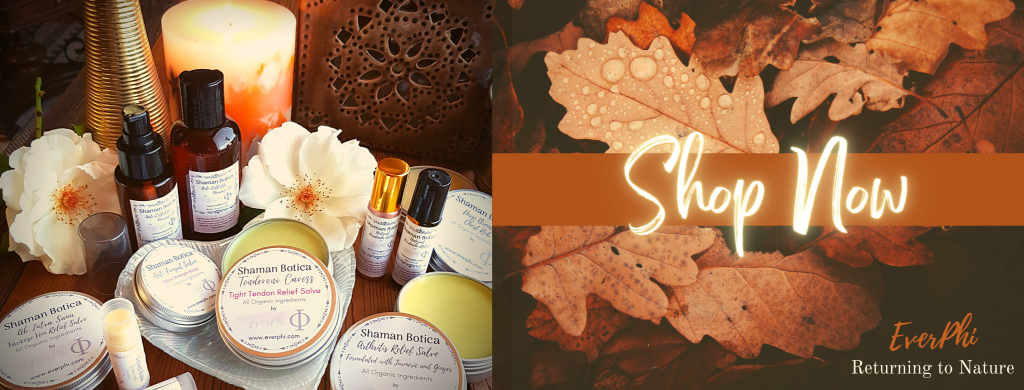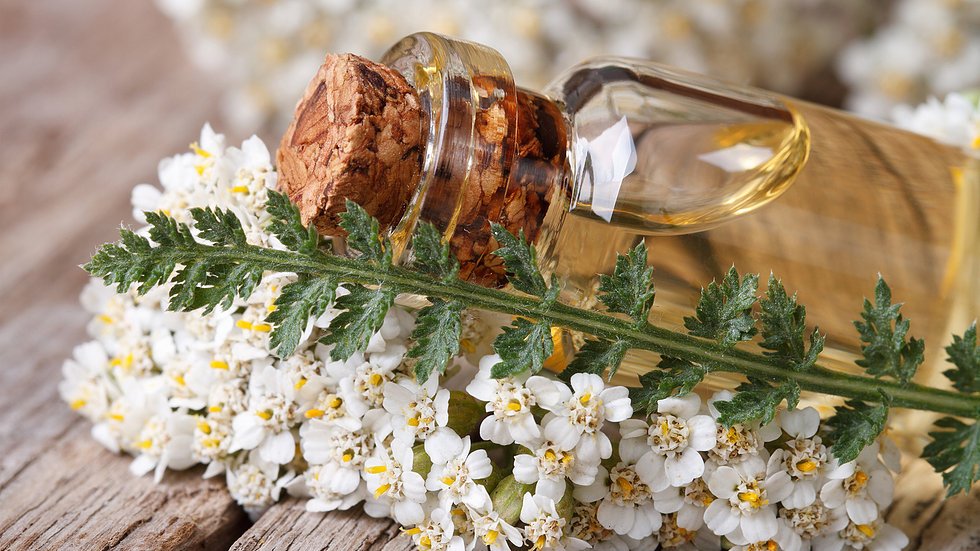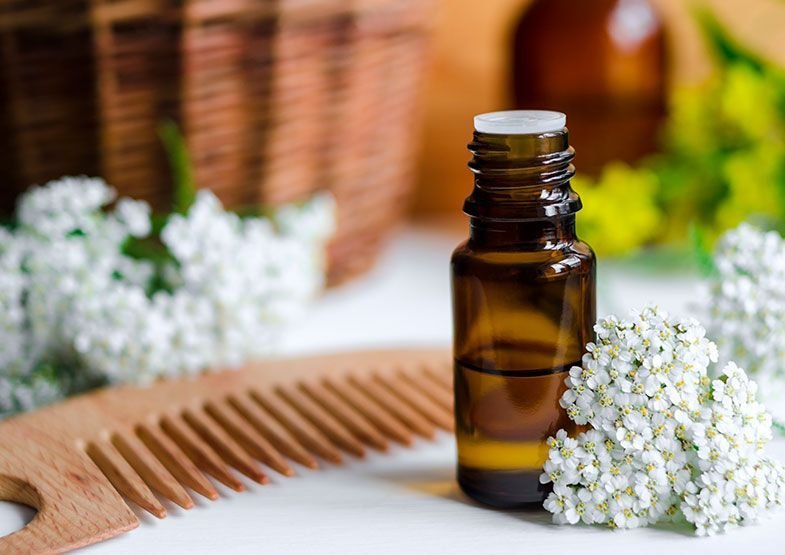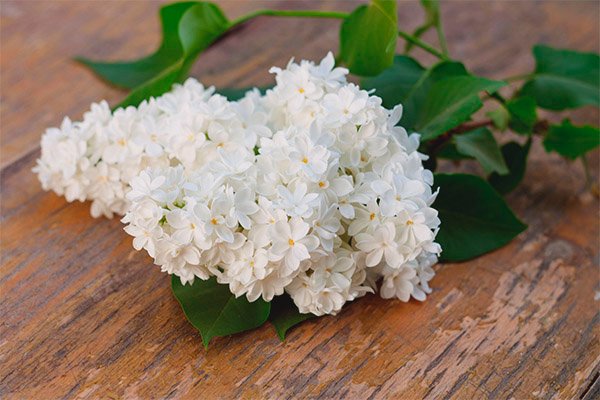
Yarrow essential oil, is the substance extracted by steam distillation of the flowers of Achillea millefolium plant.
It can be clear to yellow in color, but generally it is light blue to deep rich blue. Yarrow oil has a medium viscosity and a sharp, woody, pungent, herbaceous, fruity and somewhat sweet aroma, which is classified as mid to base note.
The most medicinally active parts of the plant are the flowering tops containing essential oil.
The essential oil of yarrow has an economical importance due to its anti-inflammatory and disinfectant properties, which are mainly used in colds and influenza treatment, and as a haemostatic (causes bleeding to stop).
Yarrow essential oil blends well with valerian, clary sage, oakmoss, eucalyptus, neroli, helichrysum, cypress, angelica, verbena, vetiver, ylang-ylang, rosemary, cedarwood, lavender, german chamomile and calendula essential oils.
The genus Achillea grows in temperate climates in dry or semi-dry habitats. It belongs to family Asteraceae and comprises of about 115 species. The most important among them having pharmacological significance is Achillea millefolium Linn, commonly known as yarrow or milfoil.
Achillea millefolium (Yarrow) is native to Europe, Asia and has naturalized throughout North America as well as to other temperate zones of the world.
Yarrow has been known by several common names including: Devil’s nettle, Old Man’s Pepper, Yarroway, Woundwort, Milfoil and Angel flower. However, it was formally named Achillea millefolium by Linnaeus in 1753.
Extensive information recorded in the literature showed that yarrow has an esteemed status in herbs with diverse pharmacological activity spectrum.
Traditional indications of its use include digestive problems, liver and gallbladder conditions, menstrual irregularities, cramps, fever and wound healing, among others.
Yarrow is a venerable plant of ancient medicinal repute. According to legend, it is said that the Greek hero Achilles used yarrow to stop the bleeding of his soldiers as well as his own wounds during the Trojan War. It is thought that the genus name, Achillea, comes from this great warrior of Greek mythology.
Roman centurions knew this plant under the name Herba militaris and later by ‘Soldier’s Woundwort’ and Carpenter’s Weed, reflecting its use for treating wounds.
The species name millefolium is derived from the common name Milfoil which comes from the French mile feuille, meaning “1000 leaves”, referring to its feathery leaves, which are divided into thousands of tiny leaflets.

It is a very important medicinal plant in Unani (Greco-Arab) system of Medicine under the name of Biranjasif, and has been used in traditional medicine for hundreds of years by various cultures.
Internally, as herbal teas for headaches, hepato-biliary disorder, gastrointestinal complaints and as an appetite enhancing drug. While externally, it has been used as lotions and ointments against skin inflammations, wounds, cuts and abrasions.
The pharmacological effects of yarrow are scientifically proven and could be attributed to different plant compounds. The essential oil mediates antimicrobial effects, the sesquiterpenes show antiphlogistic activity, the dicaffeoylquinic acids (DCQAs) exert choleretic effects, and the flavonoids cause the spasmolytic properties of the plant.
However, the chemical composition of yarrow oil has been the subject of a number of studies over the years and a wide range of chemical variation is noted.
Its natural variation is considered to be due to any one, or more of the following:
Despite the above, it can be defined that the main components in yarrow oil are: 1,8-cineole, a-Pinene, Borneol Acetate, Borneol, b-Pinene, Camphene, Linalool, Cineole, Camphor, Chamazulene, Gamma Terpinene, Isoartemisia Ketone, Limonene, Sabinene and Tricyclene.
Yarrow essential oil is Anti-inflammatory, disinfectant, antipyretic, antirheumatic, antioxidant, antiseptic, emmenagogue, antispasmodic, astringent (skin care), carminative, cell regenerative/cicatrisant, diaphoretic, digestive, expectorant, hemostatic, hypotensive, stomachic, tonic (immune system) and antiparasitic.
Besides, there are positive results on the analgesic, anti-ulcer, choleretic, hepatoprotective and wound healing activities. While, first results on other interesting therapeutical areas such as antihypertensive, antidiabetic, antitumor and antispermatogenic activities, need confirmation.
Aqueous and alcoholic extracts of yarrow are used in traditional European medicine in the treatment of inflammatory and spasmodic gastro-intestinal complaints, hepato-biliary disorders and as an appetite enhancing. Besides, yarrow contains flavonoids that increase saliva and stomach acid, helping to improve digestion.
Its internal use is approved by the Commission E for loss of appetite and dyspeptic ailments (gastric catarrh, spastic discomfort).
On the other hand, externally, it is used in form of sitz bath or as a compress against skin inflammation, slow healing wounds, bacterial or fungal infections, among others.
Other not so common uses of yarrow essential oil are: to treat chicken pox, dyspepsia, glandular system, gum ailments, heartbeat (slow), internal bleeding, liver (stimulates and regulates), lungs (hemorrhage), measles, nipples soreness, nosebleeds, piles (bleeding), smallpox, toothache, thrombosis, ulcers, urinary antiseptic, uterus (tighten and contract), mild asthma, vision, diabetes treatment, choleretic, may reduce autoimmune responses.
The volatile oils work as antibacterial, anti-inflammatory and diuretic agents. The tannins are aggressive astringents. The alkaloids are both hypotensive and hypoglycemic. Yarrow even has coumarin in its cells, which works as an anti-thrombotic to reduce high blood pressure.
The bitter compounds that the tongue detects are due to flavonoids such as saponins and unpleasant tasting but powerful alkaloids like achilleine, trigonelline and betonicine.
These are the proven facts for the actions of yarrow essential oil in the digestive system, tissues and the blood stream.
Below, some of its most studied benefits:
Yarrow essential oil possesses good anti inflammatory activity, which is used to treat rheumatism, muscle aches and heal inflamed cuts or wounds.
Its phytochemical constituent, Flavonoids, along with having an effect on prostaglandin production, also have anti-inflammatory properties. Another component of yarrow that is a powerful anti-inflammatory is chamazulene, which comprises almost half of the chemical composition of yarrow oil.
Several studies on yarrow essential oil showed antimicrobial activity against Streptococcus pneumoniae, Clostridium perfringens, Candida albicans, Mycobacterium smegmatis, Acinetobacter woffii and Candida krusei while water-insoluble parts of the methanolic extracts exhibited slight or no activity.

Anti-nociceptive is the process of blocking the detection of a painful or injurious stimulus by sensory neurons.
In a study done in mice, yarrow extracts of hydro-alcohol and essential oils were evaluated by tests of hot plate, writhing, formalin and intestinal transit in an attempt to confirm its popular use as analgesic, anti-inflammatory and antispasmodic agents.
The results showed significantly inhibited abdominal contortions. None of the extracts produced differences in intestinal transit in mice.
A cholagogue is a medicinal agent which promotes the discharge of bile from the system, purging it downward.
The cholagogue activity of yarrow essential oil may be due to the presence of unsaturated fatty acids. At the least, it has been observed unsaturated fatty acids have good cholagogue effects, and they are present in yarrow.
The control of hypertension is an important element in the management of cardiovascular diseases. Studies showed that yarrow oil exhibits a high angiotensin converting enzyme inhibition, which could be a great help in the treatment of hypertension.
In a study, the in vitro antimicrobial and antioxidant activities of the essential oil and methanol extracts of yarrow were investigated.
GC-MS analysis of the essential oil resulted in the identification of 36 compounds constituting 90.8% of the total oil.
Eucalyptol, camphor, alpha-terpineol, beta-pinene, and borneol were the principal components comprising 60.7% of the oil.
The oil strongly reduced the diphenylpicrylhydrazyl radical and exhibited hydroxyl radical scavenging effect. It also inhibited the nonenzymatic lipid peroxidation of rat liver homogenate. The polar phase of the extract showed antioxidant activity.
Yarrow oil possesses good Anti cancer activity. The phytochemical constituent of yarrow that are the flavonoids and sesquiterpenoids, have antiproliferative effects against mouse leukemia cells and cervix epithelial adenocarcinoma, breast epithelial adenocarcinoma and skin epidermoid carcinoma cells.
Recently, studies have focused on discovering new drugs from natural resources to cure skin diseases such as melanoma and introduce whitening products duo to their minimal side effects and more potency. Many of these studies focused on tyrosinase activity and expression levels of factors involving in the melanogenesis process.
Yarrow essential oil can suppress the production of melanin by down regulation of tyrosinases activity through the regulation of c-Jun N-terminal kinase (JNK) and extracellular signal-regulated kinase (ERK) signaling pathways in melanocyte stimulating hormone (α-MSH) treated melanoma cells.
Tyrosinases is an enzyme that catalyzes an oxidation-reduction reaction that is the rate-limiting enzyme for controlling the production of melanin.
The effects of Yarrow essential oil on melanogenesis alteration might be associated with its function in the suppression of relative oxygen species (ROS).
Linalyl acetate was also found to repress melanin levels, therefore having an effect on the regulation of melanogenesis.
The paper concluded that yarrow essential oil has the potential to become an ingredient in drugs, foods, and cosmetics in the future to treat hyperpigmentation.
The astringent feature of yarrow essential oil makes it a useful medication in stopping diarrhea and dysentery as well as impedes hemorrhage from the intestinal coatings.
In addition, it sterile and anti-inflammatory qualities help in healing infections and swollen organs like in the case of gastritis and enteritis.
Other research indicate the essential oil of various Achillea millefolium specimens to have strong activity against dermatophytes and antiprotozoal activity, against parasites found in the blood, and lymph such as Leishmaniasis caused by Leishmania amazonensis. Also, inhibits parasite growth in American trypanosomiasis (sleeping sickness known as Chaga’s disease).

Generally, good quality oils, that is, 100% pure and not mixed with other substances, can be found in specialized natural herb stores.